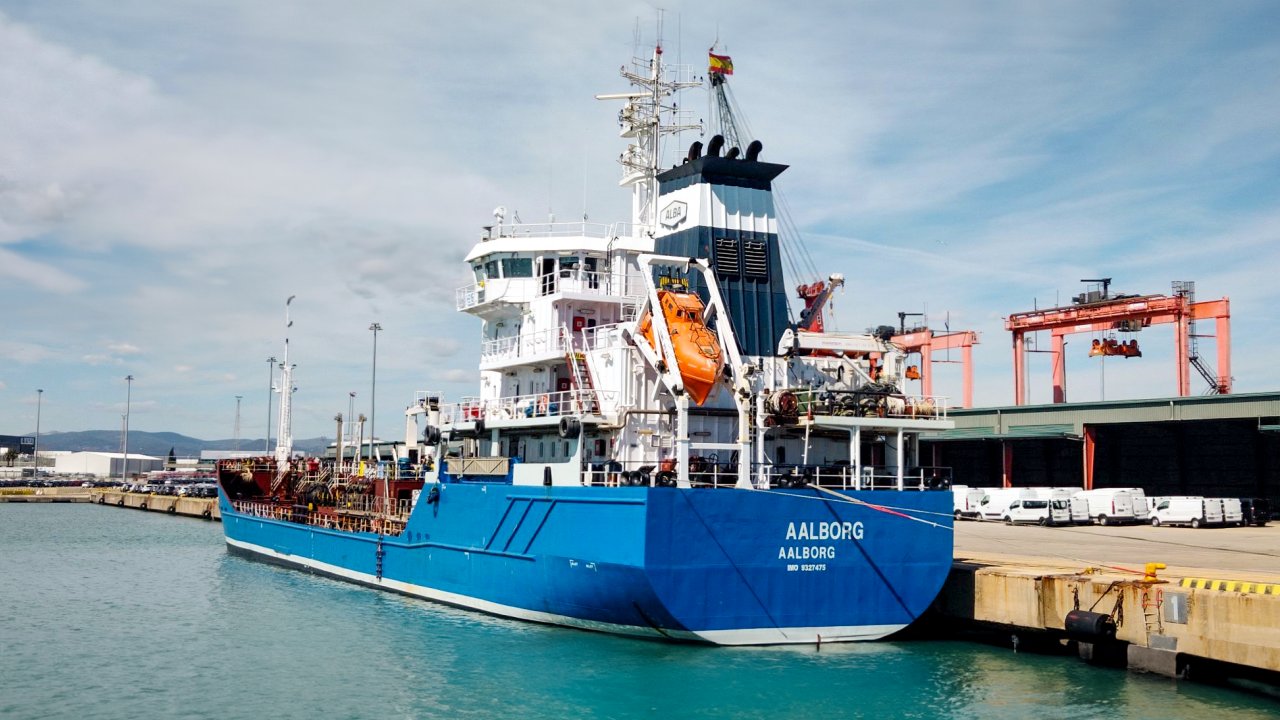
 |
Physical bunker supplier Peninsula has added the IMO II chemical tanker Aalborg to its sustainable fuel distribution capacity in the Western Mediterranean.
The vessel is capable of supplying 100% biofuels (B100), in contrast to traditional fuel barges that cannot exceed a bio component of 25%. It supplies fatty acid methyl esters ( FAME) produced from vegetable oils and allows for neutral emissions (depending on the origin of these vegetable oils), thereby reducing a receiving vessel’s carbon footprint.
The Aalborg's ability to blend multiple bio feedstocks and traditional fuels on board, together with a certificate detailing the bio component percentage, will enable ship owners to comply with impending Fuel EU Maritime regulation using the same engine.
Alejandro Morales Moreno, Supply Manager at Peninsula, emphasised the collaborative efforts between Peninsula and the Port of Barcelona, highlighting a shared vision for emissions reduction. He noted: "The addition of the Aalborg creates a meaningful, new decarbonisation solution for our customers and we're grateful to the Port Authority for facilitating its deployment in Barcelona."
Lluís Salvadó, president of the Port of Barcelona, remarked: "The importance of having a biofuel supply vessel permitted to supply up to 100% bio component, will provide Port of Barcelona users with a solution to decarbonise their activity and to fully comply with EU regulations. The Port of Barcelona, as part of its Energy Transition Plan, is committed to transition and alternative fuels such as LNG, green methanol or green ammonia, as well as biofuels, which will help to reduce the maritime sector's carbon footprint."

|
Ammonia emerges as most feasible alternative fuel for deep-sea shipping in 2050 emissions study
Research combining expert survey and technical analysis ranks ammonia ahead of hydrogen and methanol. |
|
|
|
||

|
EMSA study examines biodiesel blend spill response as shipping adopts alternative fuels
Research addresses knowledge gaps on biodiesel-conventional fuel blends as marine pollutants and response measures. |
|
|
|
||

|
BIMCO adopts ETS clause for bareboat charters, delays biofuel provision
BIMCO’s Documentary Committee has approved an emissions trading compliance clause while requesting further work on a biofuel charter provision. |
|
|
|
||

|
BIMCO and Norwegian Shipbrokers’ Association launch SALEFORM 2025 ship sale contract
Updated agreement addresses banking changes, compliance requirements and environmental regulations affecting vessel transactions. |
|
|
|
||

|
Everllence develops hydrogen test bench for marine engines
German engine maker upgrades Augsburg facility under HydroPoLEn project backed by federal maritime research funding. |
|
|
|
||

|
CMA CGM names 13,000-teu methanol-fuelled containership in South Korea
CMA CGM Osmium to operate on Asia–Mexico service as part of the carrier’s decarbonisation strategy. |
|
|
|
||

|
NorthStandard publishes biofuel guide as marine insurance claims emerge
White paper addresses quality issues and compliance requirements as biofuel testing volumes surge twelvefold. |
|
|
|
||

|
Maritime fuel platform calls for EU shipping ETS revenues to fund clean fuel deployment
Clean Maritime Fuels Platform urges earmarking of national emissions trading revenues for renewable fuel infrastructure. |
|
|
|
||

|
Lloyd’s Register grants approval for hybrid nuclear power design for amphibious vessels
Classification society approves Seatransport’s concept integrating micro modular reactors with diesel-electric systems. |
|
|
|
||

|
Everllence and Vale partner on ethanol-powered marine engine development
Brazilian mining company to develop dual-fuel ethanol engines based on ME-LGI platform. |
|
|
|
||
| Med ECA approved; zero 2050 target gains traction [News & Insights] |